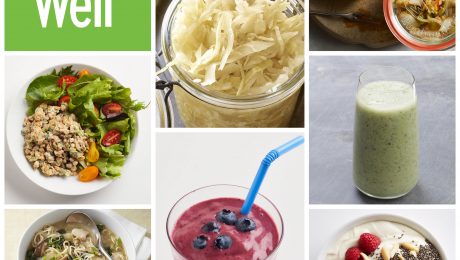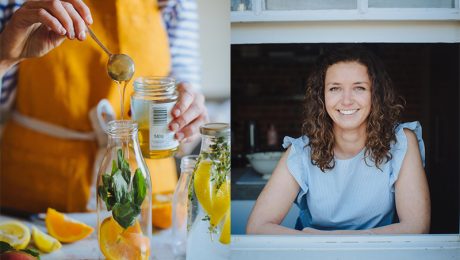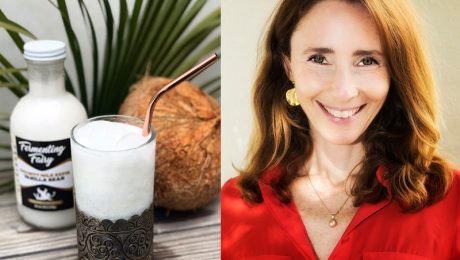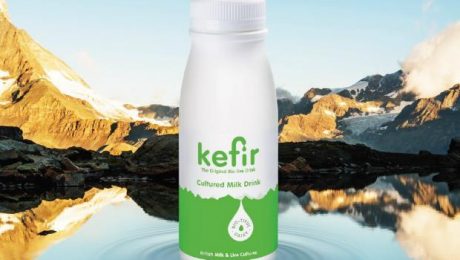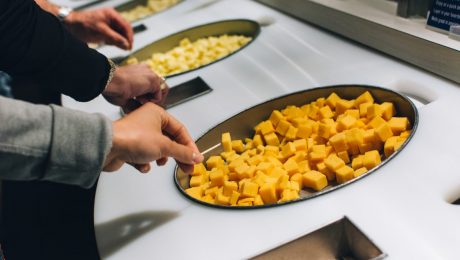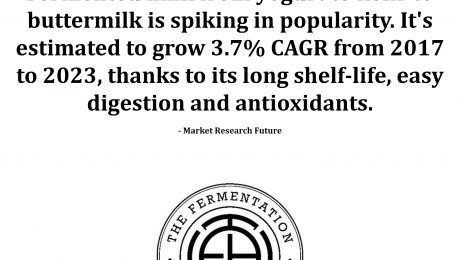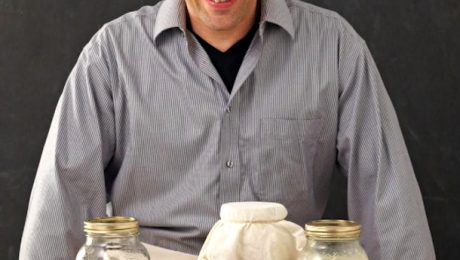Bubbling Over: 3 Fermenters on the Future of Fermentation Industry
We asked the co-founders of three fermentation brands where they see the future of the fermentation industry. Though all noted consumers are seeking fermented products for health properties, these brand leaders all gave their own interesting insight into fermentation’s growth.
Where do you see the future of the fermentation industry?
Obviously, you have a lot of beverages out there that really paved the way, kombucha has been a huge success story. But fermented vegetables I think are, one, you’re getting a ton of free press from dietitians and doctors who are saying you need to eat this stuff, the rest of the world eats this every day, Americans need to eat it, too. Second, gut health is tied into everything, and that’s pushing fermented product sales. There are studies proving gut health is linked to your mental well-being, its liked to weight managements, its linked to your skin health. Then third, exciting flavors and new and exciting brands. Fermented products need to be approachable products for the American palate, and I’m proud to say that we’re a big driver of that. We’re showing what can be done with a simple product.
Drew Anderson, Cleveland Kraut
I think it’s only going to go up from here. I see it really booming in a big way. I see a lot of activity happening in the future with new companies coming up on the horizon. I also am excited for the gut-brain connection, how ferments can really affect mental health disorders, like depression and bipolar and anxiety. I think that’s a field that were not even breaking into at all and it’s coming.
I think we’re pretty far from this but I think fermented foods can be incredibly potent in preventative medicine as well, like preventing certain diseases that are on the rise, like diabetes and cancer. I don’t want to make health claims, but i think that’s where we’re going with the industry.
Lauren Mones, Fermenting Fairy
The trend is going to continue, that people are going to continue to eat more fermented foods, that they’re going to eat more diverse and types of fermented foods that will be in the American diet. I think people are going to start caring more about where their food comes from. Fermented foods that come from farmers and soil that is improving and helping climate change rather than contributing to it. We only have about 12 more years to figure that out. People are going to really start to understand that and make choices based on that.
- Published in Food & Flavor
Eating Well Publishes 7 Must-Eat Fermented Foods for Healthy Gut
Dietician Lisa Valente writes in Eating Well the seven must-eat fermented foods for a healthy gut. Her list features: sauerkraut, kimchi, kefir, kombucha, miso, tempeh and yogurt. She writes: “Fermented foods are a hot health topic—and for good reasons. These good bacteria—particularly those in our gut—may improve digestion, boost immunity and help us maintain a healthy weight. Research is still emerging on just how important these mighty microbes might be for our health, but the early results are promising. Take care of your gut, and in turn, it will take help take care of you.”
Read more (Eating Well)
- Published in Health
Founder of Fermented By Lab Shares Food Diary Featuring Fermented Products
One question commonly posed by consumers starting to eat fermented products: How do I incorporate fermentation into my daily meals?
Alana Holloway, founder of Fermented By Lab, provides a great overview on how she uses fermented food and drinks. Hollaway’s food diary illustrates that it’s possible to include fermentation as a key element to every meal. Her simple meals are easy, delicious and highlight ways the average consumer can pair fermented food and drink with their regular food. Her dairy is also a great example of creative marketing fermented food brands can use to showcase ways to use their food.
Here’s Alana’s food diary, showcasing what she eats to keep her gut in good health.
Approach to food: I love to eat intuitively, according to the seasons… not only that, but according to the weather and how I’m feeling on any given day. After a lifelong battle with eczema, I have now found the key to managing it with the right foods for my body, and a complimentary lifestyle, too. I like to maintain a balanced, healthy gut and so eat/drink ferments every day… just as well I run a company that makes them!
Food Diary:
DAY 1 – FRIDAY
I tend to start day with about a pint of warm water. I really find it gives me immediate energy following sleep. I’m really not a lover of cold water, so will always drink it at room temperature or warm/hot.
I usually have breakfast about 10.30 as I struggle to eat too early in the morning. I like to allow my body time to build up a good hunger! Now that Spring is here, I’ve swapped my porridge for smoothies. This morning’s is organic cooked beetroot (I cook up a batch and then freeze it for smoothies), organic frozen strawberries from last Summer, a green banana, which is a great source of prebiotic fibre, coconut yoghurt, goats milk Kefir for the all-important probiotics, Plenish cashew milk (my favourite) and a little raw honey for a some more prebiotic love! I also take an omega 3 supplement; generally speaking, I’m not a massive supplement advocate and prefer to get what I need from my diet, but as I am prone to really dry skin, I find this one helps.
I grab a small handful of Brazil nuts as I head out the door.
At 1pm I have a chunk of goats Gouda and another pint on warm water whilst waiting for my lunch to cook. I can tell it’s going to be a hungry day for me today!
At 1.30, I have a lunch of sliced avocado roasted chickpeas with nigella seeds, soft boiled egg, roasted sweet potato, Fennel + Lemon Kraut from the Fermented by LAB Spring Collection, steamed broccoli & kale.
3.30 small glass of Kombucha as I need a bit of a kick!
At 7pm I have dinner – it’s lentil Dahl with Carrot + Coriander Kraut from last year’s Autumn Box (one of my favourite things about fermenting foods is getting to eat them months later!)
I drink a Golden Mylk before bed and soak some oats for tomorrow morning’s porridge… I mentioned Spring too early and hear it’s due to snow tomorrow!
DAY 2 – SATURDAY
10am – I start the day with two huge mugs of warm/hot water again and follow it with the porridge I soaked last night. I always soak my grains/pulses/legumes to make them easier on my digestive system. My porridge toppings are roasted rhubarb, coconut yoghurt, a little raw honey and some chopped Brazil’s.
3pm – Lunch is a chunk of goat’s milk Gouda (I can’t get enough of it!) and roasted broccoli, carrot, fennel, sweet potato and nigella seeds with a soft-boiled egg (again!) Despite it being the weekend, I’m working and need something easy to cook which doesn’t require too much thought!
5pm – I have a bottle of Red Grapefruit + Rosemary Kefir from the Spring Box. I’m lucky enough to be able to delve into a good selection of seasonal ferments… it means I don’t get bored with eating the same Kraut all the time!
7pm – I try to stop eating by 8pm so that I can give my digestive system a break overnight. As I had a late lunch, I’m not overly hungry so make a beetroot, carrot (both cooked and frozen), blackcurrant, green banana and goats kefir smoothie and have a mug of chicken bone broth.
I drink a small Golden Milk just before bed. They really relax me and as I have a history of eczema, find they really help keep my inflammation at bay.
Best piece of advice about health + wellbeing?
Don’t search for all the answers in one place. Every day, I try to remind myself that it’s not just about a healthy diet, a good exercise regimen, good quality sleep or daily meditation practice, for example, it’s a combination of all of them that allows you to live your healthiest and happiest life.
- Published in Food & Flavor, Health
Q&A with Lauren Mones, founder of Fermenting Fairy
Ask Lauren Mones for business advice and the founder of Fermenting Fairy will say “go grassroots.” In less than two years, Mones has grown her home-based business selling bottles of kefir outside a yoga studio to a USDA certified organic brand sold in dozens of Los Angeles health food stores and online.
Success, Mones says, did not come because she implemented scaling tactics or hired a sales manager. Instead, Mones did everything in the beginning – producing, packing, selling, inventory, money management – so she quickly learned how to troubleshoot.
“You as the founder should do everything for the business in the beginning,” She said. “When you start expanding and hiring on people, you know the pitfalls and blackholes. It’s harder. You’re going to put in a lot of work. But the payoff is big.”
In an increasingly corporate world where consumers want to support local brands, staying grassroots has been key to Fermenting Fairy’s success. Forming relationships with customers and retailers has been key for Mones to sell her coconut milk kefir, probiotic lemonade and unpasteurized sauerkraut. She still answers the company email, handles in-store demos and pitches retailers.
“What I see a lot of companies doing is they start hiring out really quickly and then they don’t see where things can go wrong, they don’t know where to create solutions,” she says. “Nowadays, customers want to support the little guys. They want artisans. They want to know who they’re buying from. And my customers know me because I answer their questions, I handle the social media account. And, if you do that, customers will go to bat for you.”
Read below for our Q&A with Mones, whose business tagline is: “A simple solution that works hard for your health.”
Q: You are open about your diagnosis with Crohn’s Disease. Tell me how that first got you interested in fermented foods.
About 5 years ago, I was actually the healthiest I’ve ever been in my life. Then, out of the blue, I was the sickest I had ever been. It was one extreme to the next. I was working full-time as an occupational therapist, racing 3-4 triathlons a year, training 20-30 hours a week plus, I was engaged to a man I loved at the time. Everything was seemingly great.
Then I started showing signs of really bad gut health. I was having bowel movements 20 times a day; I was afraid to leave the house because I never knew when I had to go. Then my bowel movements became super urgent. I was in my mid-30s and pretty much incontinent. I wasn’t absorbing any nutrients, I was losing so much weight, I could barely walk two stairs before felt like my heart was leaping out of my chest.
I finally had a colonoscopy and I was diagnosed with Chron’s. I didn’t even know what that was. The doctors told me food was irrelevant, that it had nothing to do with my disease. They said “Go eat ice cream and bread, gain your weight back.” I knew that wasn’t true. From years and years of taking part in natural, homeopathic medicine, I knew food had a lot to do with how I felt.
I went to Barnes and Noble in the cooking section and came across the book “Paleo approach.” It had a little paragraph that fermented foods might be a good idea for autoimmune diseases. I bought my first jar of good sauerkraut. I had never had good, raw sauerkraut before, just the sauerkraut you’d get at like a New York hot dog stand. I took my first bite, and it was magical. I felt this surge of energy. I felt something shift in me. I knew it was a good sign, so I started adding it 2-3 times a day to my diet. It changed my bowel movements; I was going less and less and finally had formed stools.
That really opened my eyes to fermented foods. I started making my own kefir, making my own kombucha. I was transforming my physical body. I got off all my medications after 4 months. Now fermented foods are my medicine, I don’t go a day without one of them at least.
Q: Why did you turn to live, raw fermented foods instead of a probiotic pill?
I was taking probiotic pills way before they were even a pill, starting about 25 years ago. I was getting colonics and taking probiotics before gut health was even something. I was really into natural forms of healing and optimal health. I was still taking probiotics everyday when I was diagnosed, but it occurred to me that they weren’t helping. If they were, I wouldn’t have had such a serious diagnosis. And Chrons is a serious disease.
I stopped taking the probiotic pills and turned to fermented foods because I realized, in food form, the body absorbs it better. I also really appreciated the diversity I was getting in the food, not in the pill. And it was just better for me. I loved the taste of fermented foods. Adding it to everything I ate was way easier than taking a pill. I was done with putting foreign things in my body.
Q: When did you first start Fermenting Fairy? And how?
I started in September 2017, so it’s been about 2 years. I started in this yoga studio in Santa Monica, Calif., Bhakti Yoga Shala. I had never intended to have a food company; it was never on my radar. I have always been in the health field, I’m a certified yoga teacher, but I’ve never been a foodie. When I started fermenting at home and creating these incredible recipes, I was giving food to friends, including the owner of the yoga studio. He would come back to me and say “I feel so good eating your food, why don’t you start a food company?” and I said “No way, I don’t even know how to do that.”
One day, I took a yoga class with him and I had given him this kefir. This was a big class, and he told me at the beginning in front of the class “You have to sell this, it’s so good.” About 50 people came up to me after class and asked where they could buy my food. And I thought “OK, I’ve got to start this company.”
My friend offered to have me setup a stand outside of these yoga classes. Back then, I was selling pickles and my almond kefir. I had really good responses, so I took a shot at getting into a farmers market. It happened to be one of the best farmers market — the Brentwood Farmers Market. It was serendipitous, it’s hard to get in there. And within a month I had a lot of return customers, I was selling out of products. It happened very quickly, we were doing very well off the start.
In December, I decided to fill out the Erewhon intake form online. I knew nothing about selling products in stores, I just thought “Let me try. I knew it took people 1-2 years to get into Erewhon. And then, a couple hours after I sent in the intake form, the buyer said “Wow, these look amazing — can you bring in a sample?” By February, we were in three Erehwhon stores. It was in record breaking time to get in the stores.
Eventually we pulled out of all the farmers markets and focused on wholesale. In September 2018, we started online sales so people could order from our website. And in June 2019, we received our USDA Organic certification
Q: Why do you think your products were so popular, so fast?
Because there was a major hole in the beverage sector that we fulfilled. And I honestly didn’t know that at the time. I was creating these products and these recipes for myself; it was a personal thing to heal my body. I love kefir and was playing around with non-dairy forms. I didn’t realize at the time that there was no vegan milk kefir on the market. Now the dairy industry is collapsing, more people want vegan alternatives. The other thing is our lemonade, it’s a probiotic health drink. It’s something that spans all generations that people love. We made it in a very healthy, healing way with no added sugar. I think that’s why Fermenting Fairy really took off — we fulfilled these holes that were left in the beverage industry.
Q: I love the name and logo. Tell me where the idea came from?
When I was really sick and started fermenting, I realized there was an unseen world that is working really hard in my benefit: the microorganisms, the probiotics. To me, it completely changed my life in a spiritual way. When I was really sick and in pain and constantly going to the bathroom and hating my life, those microorganisms gave me hope. It gave me hope that this reality right in front of me wasn’t it for me. There were these beings working on my behalf that brought safety and goodness to my life — like fairies. Fairies are mystical beings that bring joy and goodness to people’s lives, and I really feel that’s the energy we put into my products.
Q: Tell me about your future, where do you see Fermenting Fairy expanding?
Right now, we’re really local. We’re Los Angeles-based. we want to expand nationally and then internationally. Health stores, and then conventional stores. I would love for the entire world to get a hold of my products.
But my true, honest hope and for me the ultimate goal is to penetrate Western medicine. To get the Western doctors on board, to see my drinks on the food tray of patients at a hospital, that’s when I will really feel like I’ve done my part in shifting the world. I also see my products getting into clinical trials for cancer, autoimmune disease, researching how our products can help healing and preventing those diseases. I see a lot of research into mental health possibilities.
Q: Using fermented foods as a healing tool is very common in other countries. Why do you think the U.S. is behind in that science?
Our FDA considers fermented foods risky. Even when California passed the Cottage Food Law, which allows you to start a food company at home, the law still won’t allow you to start a fermented food company at home because they consider fermented foods a dangerous food. Things are not going to shift quickly until we realize eating fermented foods is safer than eating a salad. The U.S. is a ways behind in realizing how safe and healing fermented foods are. Europe is way ahead of us on that.
Q: What myths do you think the public believes about fermented foods?
One, that they’re dangerous. Eating raw vegetables are more dangerous than fermented foods. When done right, fermented foods actually prevent any kind of Listeria or E.coli infection.
Another myth people tell me is “I tried kombucha and didn’t like it, so I don’t like fermented foods.” To people that say that, I ask well do you like yogurt? The biome of the ocean is the same as the biome of the forest. It couldn’t be more different. If one fermented food didn’t work for you, then try some others because they’re all different.
Q: How can we as an industry do a better job educating the public about fermented foods?
Before fermented foods really exploded — because we’re right on that cusp of explosion — there needs to be a ton of education. I think having more organizations like The Fermentation Association is really amazing. You bring light to things that are happening, highlighting great companies where great things are happening.
I don’t see a lot of fermented food companies doing a lot of social media education. I’d like to see more of that, I’m diving into it myself, doing educational videos on Instagram. I’m all about education on social media.
I think it’s important for all these companies creating these ferments to try and talk to the people that are so closed off to it. I’m friends with a lot of doctors because of my job history. They have so much power and influence, but they are the most closed off people to fermented foods that I know. Penetrating that medical community will be huge for us. That education piece will unleash a whole new set of people that we can really help.
Q: Do you think consumer awareness of fermented foods is increasing?
Oh yeah, for sure. It’s definitely on the increase. I think, as gut health becomes more relevant to all health, I think fermented foods will just ride that opening. I think consumers are definitely getting more savvy in that awareness of fermented foods. But there’s still a lot of fear around it. All the time still, when I’m doing in store demos, and I say “Do you want to try a sip of kefir?” still there are people who respond “Oh my god, no.” I get that reaction all the time still and it’s so heartbreaking. Awareness is increasing, but fear is still a major factor.
Q: From your Cardamom Rose Coconut Milk Kefir to Apple Cinnamon Sauerkraut, tell me about your unique flavors. Where do you draw flavor inspiration?
Nowhere special. I love plants, I love flowers, I love herbs, I love studying the synergistic qualities of them. I know about the healing properties of plants. I’ve picked plants and herbs that not only have major healing qualities but they work well together. I don’t really get my inspiration from anyone else. It comes to me and I study what works.
I can’t think too much out of the box because it doesn’t work for people. If it’s too strange for people, it won’t sell. We had a cacao basil kefir and it was delicious, but it didn’t sell. It was an odd combination for people. They have to work together synergistically for people, and spin it so it’s right outside the box but not too far out. On July 4th, we’re launching our newest flavor kefir, a turmeric chai spice.
Q: Where do you see the future of the fermented food industry going?
I think it’s only going to go up from here. I see it really booming in a big way. I see a lot of activity happening in the future with new companies coming up on the horizon. I also am excited for the gut-brain connection, how ferments can really affect mental health disorders, like depression and bipolar and anxiety. I think that’s a field that were not even breaking into at all and it’s coming.
I think we’re pretty far from this but I think fermented foods can be incredibly potent in preventative medicine as well, like preventing certain diseases that are on the rise, like diabetes and cancer. I don’t want to make health claims, but i think that’s where we’re going with the industry.
Q: What challenges do fermented food producers face?
The No. 1 challenge is global warming. It’s harder and harder for farmers to produce the quality and quantity that we as small fermented food companies need because of the extreme weather patterns. So one day in California that’s 115 -120 degrees can completely fry all the fruit trees. Then what happens to us is we try to get this organic produce and either the prices are extremely high because of that heat or there’s no good quality produce anymore. I think it’s only going to get worse if we don’t do something about it. I see that as the No. 1 challenge for small — and even the big ones — fermented food companies in general. We have to be a part of that solution, we can’t let that go.
I am adamant about getting certified organic. And if you’re not getting organic, at least using it. A lot of fermented food companies are getting the cheap ingredients and they’re adding to the problem of global warming and poor soil health. I highly disagree with it. It’s only going to make it worse for them in the future. We’re part of the solution, if you’re not doing it for the life of your company, at least do it for the life of yourself and your customers.
Q: What unique strengths do fermented producers bring to the food industry?
I think most of us are probably nature-loving people. I think we see a connection between nature and human health, so we can be really passionate about that and passionate about elevating the quality of food that’s out there. Because now it’s poor quality food that’s out there, but artisanal, handcrafted fermented food companies can change that. Here’s really high-quality, fermented foods. The more people that catch on to that, the more people that will move away from the cheap food and to more boutique food that provide health benefits.
The strengths are loving and respecting nature, respecting the tie between human health and nature and also being super passionate about creating more quality in the food world.
- Published in Food & Flavor, Health
Athletes: Fermented Food & Drink Best for Performance Enhancement
Put down the Gatorade, athletes — the best performance-enhancing substance is fermented food and drinks. An article in sports magazine STACK says athletes are overlooking fermented products for workout nutrition. Fermented products — like raw sauerkraut, kimchi, yogurt and kefir — heal the body with beneficial bacteria and combat gut imbalances. “The better our digestion, the better we utilize the food we are putting into our body, leading to even better improvements in our strength and health,” the article states. Though there is little research in the field, the article points to one study which found probiotics helped female college athletes improve body composition and deadlift performance.
Read more (STACK)
- Published in Science
Danone Releases Collection of 1,800 Yogurt Strains to Celebrate 100th Anniversary
To celebrate its 100th anniversary, Danone is releasing its collection of 1,800 yogurt strains to the public. In a press release, Danone said the announcement coincides with Danone’s “commitment to promoting open science, a movement toward openness in scientific research, sharing and development of knowledge through collaborative networks.” Danone would like others to use the strains for research purposes. The French company is also granting access to its current collection of 193 lactic and bifidobacteria ferment strains deposited at the National Collection of Cultures of Microorganisms, held in the Biological Resource Center of Institut Pasteur in Paris. The first Danone yogurt was made by Isaac Carasso in 1919 in Barcelona. Barcelona’s own children suffered from poor gut health, and he was inspired by research from the Institute Pasteur that detailed the role of ferments in gut and overall health. Barcelona began selling his first yogurts, which were fermented with lactic ferments, in Barcelona’s pharmacies.
Read more (Danone)
40% of Kefir Sales from Seniors
Seniors are driving the kefir market, a surprising industry stat since marketing of the fermented dairy drink is targeted at millennials. But new research from the Grocer found 40 percent of kefir sales in the UK were consumed by adults over the age of 65. People aged 16 to 44 accounted for 27.9 percent of kefir consumption. Analysts speculate its because kefir is likely to be consumed for particular health needs, which range from bone-strengthening nutrients to digestive aids, all factors people focus on as they age. “Add that the fermentation process makes it much easier to digest – because humans lose some of the ability to digest cows milk beyond age three – and even in the absence of multimillion-pound marketing budgets, the word of mouth marketing has spread like wildfire,” Bio-tiful Dairy founder Natasha Bowes.
Read more (The Grocer)
Researchers Identify Which Protein Fragments Responsible for Flavor
Researchers have developed a way to identify the “flavor-giving protein fragments” in fermented dairy products. The exact taste of fermented foods has been somewhat of a mystery to scientists. Of the thousands of different protein fragments in fermented milk products, it was always unknown which protein was responsible for flavor. But new research from TUM (Technical University of Munich) whittled down those approximately 1,600 protein fragments responsible for the bitter fermented flavor to just 17. This research is important to foodpreneurs wanting to optimize flavors in their fermented products
Read more (Science Daily) (Photo: Foodies Feed)
- Published in Science
Sales of Fermented Milk – From Kefir to Yogurt – Growing
Fermented milk from yogurt to kefir to buttermilk is spiking in popularity. It’s estimated to grow 3.7% CAGR from 2017 to 2023, thanks to its long shelf-life, easy digestion and antioxidants.
The Fermentation Association (TFA), getting more people to enjoy fermented products. Join us at The Fermentation Association.
- Published in Business
Fermentation and Mixology – Fermentation Guru Alex Lewin Shares Techniques
Where do fermentation and mixology meet? Fermentation guru Alex Lewin and author of “Kombucha, Kefir, and Beyond” is sharing his techniques at Culture Club 101 in Pasadena on Oct. 7. Alex will share the history of fermented drinks, their health benefits and demo fermented drink creations. Join us Oct. 7 act Culture Club 101 in Pasadena.
Read more (Culture Club)
- Published in Food & Flavor


